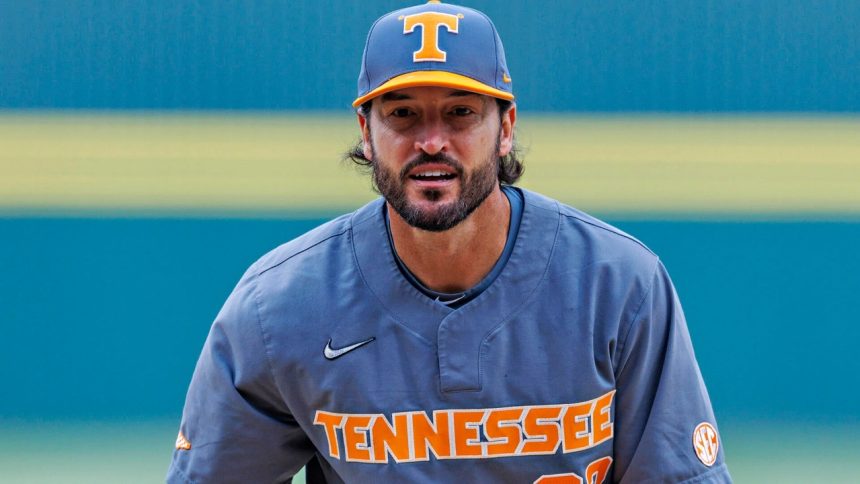When the San Francisco Giants announced they’d hired Tony Vitello away from the University of Tennessee, it wasn’t just a routine coaching change—it was a historic move. For the first time, a Major League Baseball team has hired a manager directly from a college program, with no professional coaching experience to speak of. This unprecedented jump sent everyone scrambling to understand the financials behind the decision. Did Vitello take a pay cut for this dream job? Or did the Giants back up the Brink’s truck to lure him away from his rock-star status in Knoxville? The answer, after a whirlwind of reports, is a fascinating tale of modern baseball business.
The initial reports created quite a stir. Just hours after the news broke, prominent MLB reporter Bob Nightengale stated that Vitello was actually taking a “major pay cut” to manage the Giants. The figures seemed to back this up; Vitello was earning a hefty $3.3 million annually in salary and benefits at Tennessee. The idea of leaving a cushy, multi-million dollar job as a college legend for the grueling 162-game MLB season seemed like a labor of love. However, that narrative was quickly turned on its head. Within a short time, new reports emerged, clarifying that Vitello was, in fact, getting a “considerable raise” to make the leap to the pros.
You Might Like: Shia LaBeouf, Mia Goth, and Their Daughter
The Financial Details of a Groundbreaking Hire
So, what’s the real number? Let’s break down the digits. At Tennessee, Tony Vitello was one of the highest-paid coaches in college baseball. After leading the Volunteers to the 2024 National Championship, he signed a contract extension that paid him $3 million per year in base salary. When you add in benefits, his total compensation package at Tennessee was worth approximately $3.3 million annually. This wasn’t just college money—that salary was higher than what several active MLB managers were making before this hiring cycle.
To pry him away from that secure, high-profile job, the San Francisco Giants had to make it financially worthwhile. The team offered Vitello a three-year contract that will pay him $3.5 million per year. The deal also includes a vesting option for a fourth season, giving Vitello a chance to secure his future even further. This new contract makes his total earnings higher than his $3 million Tennessee base salary, confirming he received a raise. Furthermore, his $3.5 million annual pay is officially the highest contract in MLB history for a first-year manager. This immediate places him in the top half of MLB managers in terms of salary, a remarkable feat for someone new to the professional level.
The #SFGiants announced today that they have named Tony Vitello the 40th field manager in club history. pic.twitter.com/PB7VtOwePU
— SFGiants (@SFGiants) October 22, 2025
The Giants’ financial commitment, however, goes even deeper than Vitello’s salary. The club is also on the hook for his $3 million buyout to the University of Tennessee. Because he stayed with the Vols through June 30, that buyout decreased from an initial $4 million to the final $3 million sum. On top of that, the Giants are still paying their previous manager, Bob Melvin, whom they fired after an 81-81 season. The team owes Melvin $4 million for the 2026 season.
All told, for the privilege of having Tony Vitello manage the team in 2026, the Giants are investing $10.5 million in manager salaries and buyouts alone ($3.5M for Vitello + $3M buyout + $4M to Melvin). This massive financial outlay underlines how much President of Baseball Operations Buster Posey wanted Vitello to lead this team.
A New Era in San Francisco
This hire signals a bold new direction for the San Francisco Giants. By going outside the traditional pool of veteran MLB coaches or up-and-coming base coaches, Buster Posey is making his mark. He’s betting that Tony Vitello’s proven ability to lead, develop talent, and foster a winning culture at Tennessee will translate to the major leagues. Vitello is known for his high energy, competitiveness, and ability to connect with players, qualities that Giants leadership felt “align perfectly with the values of our organization.”
The challenge ahead is substantial. Vitello has to adjust to the relentless 162-game MLB schedule, manage a clubhouse of established, multimillionaire veterans, and handle in-game decisions at the most competitive level in the world. He won’t have the recruiting advantage he enjoyed in college, instead needing to work with a roster built by the front office. But for the Giants and their fans, the hope is that Vitello’s fresh perspective and fiery passion are exactly what’s needed to shake up a team that has missed the playoffs eight of the last nine years.
With a solid core of players and a manager now being paid among the best in the game, the Giants are betting big that a college coach can make the historic leap a successful one.



